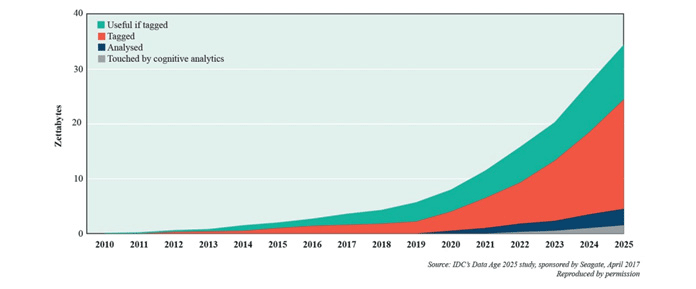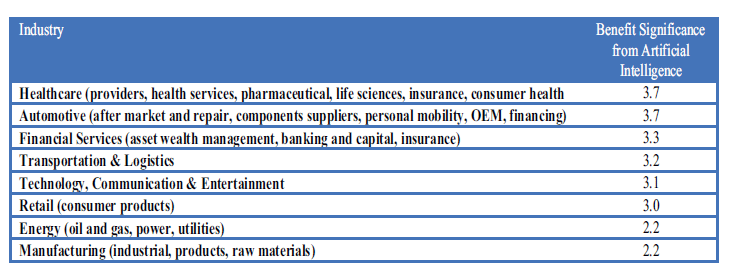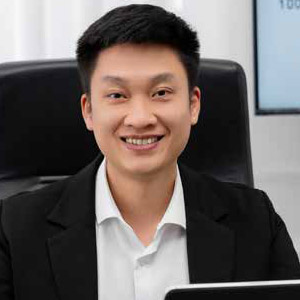THANK YOU FOR SUBSCRIBING
Editor's Pick (1 - 4 of 8)

The 'Cognitive Enterprise' in a 4th Industrial Revolution World
Rocky Scopelliti - Futurologist & Author


Rocky Scopelliti - Futurologist & Author
Equally, our digital lives, real-time expectations and personalised experiences have been shaped on a well-orchestrated symphony of data.
Data is the lifeblood source of our digital existence. But unlike natural resources, it seems we treat it like there is an infinite supply of this valuable unnatural resource and we can somehow afford inefficiency and ineffectiveness because of its abundance. In fact, it is this abundance that creates a fundamental problem: the ability to identify and exploit the data that matters in a seemingly inexhaustible flood. Data also has some fundamentally different properties – unlike physical assets – the value of data increases through sharing and reuse.
 While data is the competitive currency of organisations in this digital age, few treat it as such.
Cognitive systems that change the landscape
Artificial intelligence and machine learning are two of the hottest topics at the moment. These emerging technologies collectively referred to as cognitive systems, convert data analysis into intelligence.
Cognitive automation replicates human actions and judgement at tremendous speed, scale, quality and lower cost. IDC predicts that by 2025, the amount of analysed data will grow by a factor of 50 to 5.2ZB and the amount of analysed data exposed to cognitive systems will grow by a factor of 100 to 1.4ZB (see Figure 1)
The artificial intelligence race is on by nations and enterprises
According to PWC , artificial intelligence could drive GDP gains of US$15.7 trillion with productivity and personalisation improvements. It claims global GDP could be 14 per cent higher in 2030 as a result of artificial intelligence of which productivity improvements could account for about half. PWC also reports that the greatest economic gains from artificial intelligence will be in China (26 per cent growth in GDP by 2030) and in North America (14.5 per cent growth) – the equivalent of US$10.7 trillion. It’s pretty obvious why these countries are in an artificial intelligence race.
At an industry level, its analysis reveals those that stand to benefit most (score of 5) and the least (score of 1) (see Table 1).
While data is the competitive currency of organisations in this digital age, few treat it as such.
Cognitive systems that change the landscape
Artificial intelligence and machine learning are two of the hottest topics at the moment. These emerging technologies collectively referred to as cognitive systems, convert data analysis into intelligence.
Cognitive automation replicates human actions and judgement at tremendous speed, scale, quality and lower cost. IDC predicts that by 2025, the amount of analysed data will grow by a factor of 50 to 5.2ZB and the amount of analysed data exposed to cognitive systems will grow by a factor of 100 to 1.4ZB (see Figure 1)
The artificial intelligence race is on by nations and enterprises
According to PWC , artificial intelligence could drive GDP gains of US$15.7 trillion with productivity and personalisation improvements. It claims global GDP could be 14 per cent higher in 2030 as a result of artificial intelligence of which productivity improvements could account for about half. PWC also reports that the greatest economic gains from artificial intelligence will be in China (26 per cent growth in GDP by 2030) and in North America (14.5 per cent growth) – the equivalent of US$10.7 trillion. It’s pretty obvious why these countries are in an artificial intelligence race.
At an industry level, its analysis reveals those that stand to benefit most (score of 5) and the least (score of 1) (see Table 1).
 Table 1: Industry benefits from artificial intelligence
The eruption of artificial intelligence means that within the next five years we are likely to see artificial intelligence cognitive competitors emerge across many sectors. To traditional organisations struggling to transform their data and analytics environments, cognitive competitors will be able to attack their business models in ways and at scales, that non-transformed traditional organisations will struggle to detect, and respond to. The giant leap is shifting our thinking away from this resource (data) and its abundance, to it becoming the organisational intelligence – ‘The Cognitive Enterprise’.
Transforming to compete cognitively in the 4th Industrial Revolution requires a new leadership principle – one centred on constant adaption. Juvenescence, I propose will be the common characteristic found in successful next generation Cognitive Enterprises, and those that lead them.
Table 1: Industry benefits from artificial intelligence
The eruption of artificial intelligence means that within the next five years we are likely to see artificial intelligence cognitive competitors emerge across many sectors. To traditional organisations struggling to transform their data and analytics environments, cognitive competitors will be able to attack their business models in ways and at scales, that non-transformed traditional organisations will struggle to detect, and respond to. The giant leap is shifting our thinking away from this resource (data) and its abundance, to it becoming the organisational intelligence – ‘The Cognitive Enterprise’.
Transforming to compete cognitively in the 4th Industrial Revolution requires a new leadership principle – one centred on constant adaption. Juvenescence, I propose will be the common characteristic found in successful next generation Cognitive Enterprises, and those that lead them.
 While data is the competitive currency of organisations in this digital age, few treat it as such.
Cognitive systems that change the landscape
Artificial intelligence and machine learning are two of the hottest topics at the moment. These emerging technologies collectively referred to as cognitive systems, convert data analysis into intelligence.
Cognitive automation replicates human actions and judgement at tremendous speed, scale, quality and lower cost. IDC predicts that by 2025, the amount of analysed data will grow by a factor of 50 to 5.2ZB and the amount of analysed data exposed to cognitive systems will grow by a factor of 100 to 1.4ZB (see Figure 1)
The artificial intelligence race is on by nations and enterprises
According to PWC , artificial intelligence could drive GDP gains of US$15.7 trillion with productivity and personalisation improvements. It claims global GDP could be 14 per cent higher in 2030 as a result of artificial intelligence of which productivity improvements could account for about half. PWC also reports that the greatest economic gains from artificial intelligence will be in China (26 per cent growth in GDP by 2030) and in North America (14.5 per cent growth) – the equivalent of US$10.7 trillion. It’s pretty obvious why these countries are in an artificial intelligence race.
At an industry level, its analysis reveals those that stand to benefit most (score of 5) and the least (score of 1) (see Table 1).
While data is the competitive currency of organisations in this digital age, few treat it as such.
Cognitive systems that change the landscape
Artificial intelligence and machine learning are two of the hottest topics at the moment. These emerging technologies collectively referred to as cognitive systems, convert data analysis into intelligence.
Cognitive automation replicates human actions and judgement at tremendous speed, scale, quality and lower cost. IDC predicts that by 2025, the amount of analysed data will grow by a factor of 50 to 5.2ZB and the amount of analysed data exposed to cognitive systems will grow by a factor of 100 to 1.4ZB (see Figure 1)
The artificial intelligence race is on by nations and enterprises
According to PWC , artificial intelligence could drive GDP gains of US$15.7 trillion with productivity and personalisation improvements. It claims global GDP could be 14 per cent higher in 2030 as a result of artificial intelligence of which productivity improvements could account for about half. PWC also reports that the greatest economic gains from artificial intelligence will be in China (26 per cent growth in GDP by 2030) and in North America (14.5 per cent growth) – the equivalent of US$10.7 trillion. It’s pretty obvious why these countries are in an artificial intelligence race.
At an industry level, its analysis reveals those that stand to benefit most (score of 5) and the least (score of 1) (see Table 1).
 Table 1: Industry benefits from artificial intelligence
The eruption of artificial intelligence means that within the next five years we are likely to see artificial intelligence cognitive competitors emerge across many sectors. To traditional organisations struggling to transform their data and analytics environments, cognitive competitors will be able to attack their business models in ways and at scales, that non-transformed traditional organisations will struggle to detect, and respond to. The giant leap is shifting our thinking away from this resource (data) and its abundance, to it becoming the organisational intelligence – ‘The Cognitive Enterprise’.
Transforming to compete cognitively in the 4th Industrial Revolution requires a new leadership principle – one centred on constant adaption. Juvenescence, I propose will be the common characteristic found in successful next generation Cognitive Enterprises, and those that lead them.
Table 1: Industry benefits from artificial intelligence
The eruption of artificial intelligence means that within the next five years we are likely to see artificial intelligence cognitive competitors emerge across many sectors. To traditional organisations struggling to transform their data and analytics environments, cognitive competitors will be able to attack their business models in ways and at scales, that non-transformed traditional organisations will struggle to detect, and respond to. The giant leap is shifting our thinking away from this resource (data) and its abundance, to it becoming the organisational intelligence – ‘The Cognitive Enterprise’.
Transforming to compete cognitively in the 4th Industrial Revolution requires a new leadership principle – one centred on constant adaption. Juvenescence, I propose will be the common characteristic found in successful next generation Cognitive Enterprises, and those that lead them.











